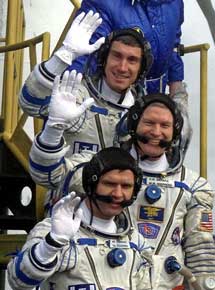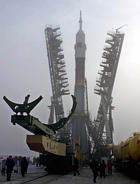|
November 1, 2000
BAIKONUR, Kazakstan (AP) — American astronaut Bill Shepherd and two Russian cosmonauts rocketed into orbit Tuesday on a quest to become the first residents of the international space station and begin fulfilling the once-fantastic dream of permanent occupancy in space.``Let's go do it!'' Shepherd, the space station's inaugural commander, shouted before climbing into the Soyuz rocket and blasting off from the same pad where the Space Age began 43 years ago, with Sputnik.
``It's history again repeating itself, in a different way,'' said Joe Rothenberg, head of the U.S. National Aeronautics and Space Administration's human space flight program. ``Space shouldn't be the same again.''
The $60 billion-plus station, a joint project among the United States, Russia, Canada, Japan and 10 member countries of the European Space Agency, has been called the largest technological enterprise ever undertaken on a global scale.
``It will be a laboratory like every professor wishes he had here on Earth — and open 24 hours a day,'' said Joerg Feustel-Buechl, director of manned space flight for the European Space Agency. He monitored the launch with Russian and other space officials at Russian Mission Control in Korolyov, outside Moscow.The 17-story green rocket, transformed into a frosty white by the super-cold fuel, vanished into dense fog three seconds after liftoff from the Baikonur Cosmodrome. Its brightly burning engines were visible several seconds later as the rocket gained speed and altitude. The roar, by then, was deafening to the more than 500 gathered at the Central Asian cosmodrome.
Nine minutes later, Shepherd and his crew mates, Yuri Gidzenko and Sergei Krikalev, were in orbit and giving chase to the international space station. The complex was soaring 240 miles above the Sahara when they took off, more than two years late as a result of Russia's economic troubles, which stalled space station assembly.
The three men will reach their new home on Thursday and settle in for a four-month stay. The station's official language is English, though the crew says they will communicate in ``Runglish,'' a mix of Russian and English, and Russian is expected to be used when communicating with ground controllers outside Moscow.
There was no countdown at the cosmodrome, only occasional and curt reports blaring from loudspeakers. Several seconds before liftoff, the command, ``Zazhiganiye,'' or ``Ignition,'' was given and the 20 engines burst into flames. Clouds of dark smoke rolled across the barren desert.
NASA Administrator Daniel Goldin waited until Shepherd and his crew were safely in orbit before hugging top Russian officials and giving a high-five to Rothenberg, his deputy.
The deputy director general of the Russian Space Agency, Valery Alaverdov, pressed a goblet into Goldin's hands and poured scotch from a bottle. ``Success,'' Alaverdov toasted. ``Here's to a great space program,'' Goldin replied.
``There are so many people who felt maybe we couldn't do it,'' Goldin told reporters moments later, referring to the years of agonizing delay. ``But it's happening. It's here. We're going to be in space forever with people who are circling this globe and then we're going on to Mars, back to the moon and with bases on asteroids.''
Shepherd's wife, Beth Stringham-Shepherd, celebrated the successful launch her own way — she passed out cigars and puffed long and hard on one.Shepherd, who had been training and waiting nearly five years for this mission, blew kisses to his wife before he left and kept flashing a thumbs-up to his colleagues.
``Give us a fast ship,'' Shepherd, a 51-year-old Navy captain, urged the NASA and Russian space officials who saw him off.
``May you have a fair wind and a following sea,'' replied his boss, George Abbey, director of the Johnson Space Center in Houston.
Shepherd and his crew — NASA's so-called Expedition One — are in for a busy and difficult next few weeks. As soon as they arrive at the space station, they will activate all the life-support systems and start tackling all the maintenance and repair chores that have been piling up since the new living quarters joined the rest of the complex in July.Visiting space shuttle astronauts took care of as many chores as they could in September and again in October, but the bulk of the work had to wait for the experts — Shepherd, an accomplished home mechanic, and his crew.Space shuttle crews will visit two more times, delivering giant electricity-producing solar panels and the American lab Destiny, before Discovery arrives in February to bring Shepherd, Gidzenko and Krikalev back to Earth. They will be replaced by a fresh crew. And so it will go, for the next 15 years and possibly even longer.
NASA hopes to finish building the space station in 2006 and keep using it for scientific research for at least a decade beyond that.
``There's so much more to do,'' said Michael Foale, a NASA astronaut who's in charge of the space station expedition crews. ``But it's a transition for all of us psychologically to think that we're doing something real rather than something we've always imagined.''
Foale added hopefully: ``I have often thought this may be the last time that there were no humans in space, and I really believe that could be today.''
On the Net:
NASA, http://spaceflight.nasa.gov
|


